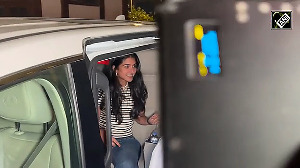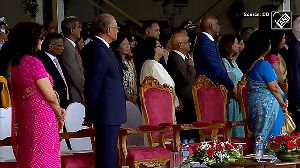Jackie Stewart was probably the only person fretting about thermal underwear at Bahrain's desert circuit.
"You look at the drivers here and they will all have short-sleeved thermal (fireproof) underwear and shorts," declared the Scot, a tireless campaigner on safety issues as a three-times Formula One champion.
"Not good. They should have full length thermal underwear right down to their ankles...I think it should be compulsory for every driver."
When it comes to Formula One safety, there is always something to worry about.
Next week's San Marino Grand Prix marks a return, possibly for the last time, to the Imola circuit where Brazil's three-times champion Ayrton Senna and Austrian Roland Ratzenberger died a decade ago.
That weekend was a watershed for the sport, Formula One's last fatalities turning safety into an absolute priority. Much has been achieved since then.
"For 10 years we haven't lost a driver," said Stewart. "For twelve-and-a-half years before that weekend we hadn't lost a driver. That's pretty impressive. More people die fishing than die in Formula One cars.
"That doesn't mean to say that tomorrow or the next day we can't have a terrible accident. But what has been done for safety is immense."
WAKE-UP CALL
The tragic weekend of 1994, coupled with Austrian Karl Wendlinger's serious accident at Monaco a few weeks later, came as a wake-up call.
The sport's biggest crisis in years prompted immediate changes, with measures including cars being modified to reduce downforce and engine sizes cut from three-and-a-half litres to three.
Tethers were introduced to prevent wheels flying off, crash tests became far more stringent, and circuits underwent substantial modifications.
Most recently, drivers have been forced to wear HANS head and neck restraints to limit their vulnerability in head-on accidents.
"I think there was a certain amount of complacency by the time Imola happened but I don't believe that's the case any longer," International Automobile Federation (FIA) President Max Mosley told Reuters.
"The real legacy for Formula One from Imola has been the (FIA) safety commission and the research group," he added. "They meet regularly and constantly work on safety, trying to update and upgrade it all the time.
"None of that means that we couldn't have a serious accident, in fact we've been quite lucky once or twice. But it reduces the probability.
"It's very, very seldom now that if something is shown to be safer that we can't get immediate unanimous agreement to bring it in," said Mosley.
"I think (Imola) was certainly when Formula One woke up to the idea that safety had to be attacked scientifically and systematically and on an ongoing basis, just as the performance of the cars was."
BETTER BARRIERS
Mosley said making the cars stronger was one thing but it was equally important to prevent the driver being subjected to G-forces greater than his body could withstand.
"That means crashes have to be progressive so one's always looking at better barriers, better ways of absorbing an impact to the cars, of slowing the cars down between the moment of lost control and impact if there is one," he said.
"It's now a programme of many measures, each of which depends on the other."
Senna would probably have survived a similar accident on the old Imola circuit at the wheel of a modern car, such have been the advances made, but there will always be an element of luck.
It was former champion Niki Lauda who said at Imola that "God has had his hand over Formula One for a long time. This weekend, he took it away".
It could happen again, however many precautions are taken, and Mosley is particularly concerned at present with indications that cornering speeds are again rising sharply.
He said the most important thing was to never be in a situation where you could do something and did not do it.
The Briton cast his mind back to his own days as a Formula Two racer, recalling his first race at Hockenheim in the 1960s and how three of the 21 drivers on the starting grid died in the space of four months.
"It was like being in Vietnam," said Mosley. "And the worst thing was you knew that it was preventable. It really wouldn't take that much to see that it didn't happen.
"Things that are nerve-racking to watch, like a trapeze artist, don't depend on somebody getting killed every now and then," he added.
"I think one of the great myths is that Formula One is less interesting because it isn't as dangerous as it was. All the figures point the other way.
"In the days when it killed at least one person a year, it had virtually no television coverage...Now it's become much safer and it's up there with football.
"I think that if a sport starts to kill people, you won't have the sport for very long."








 © 2025
© 2025